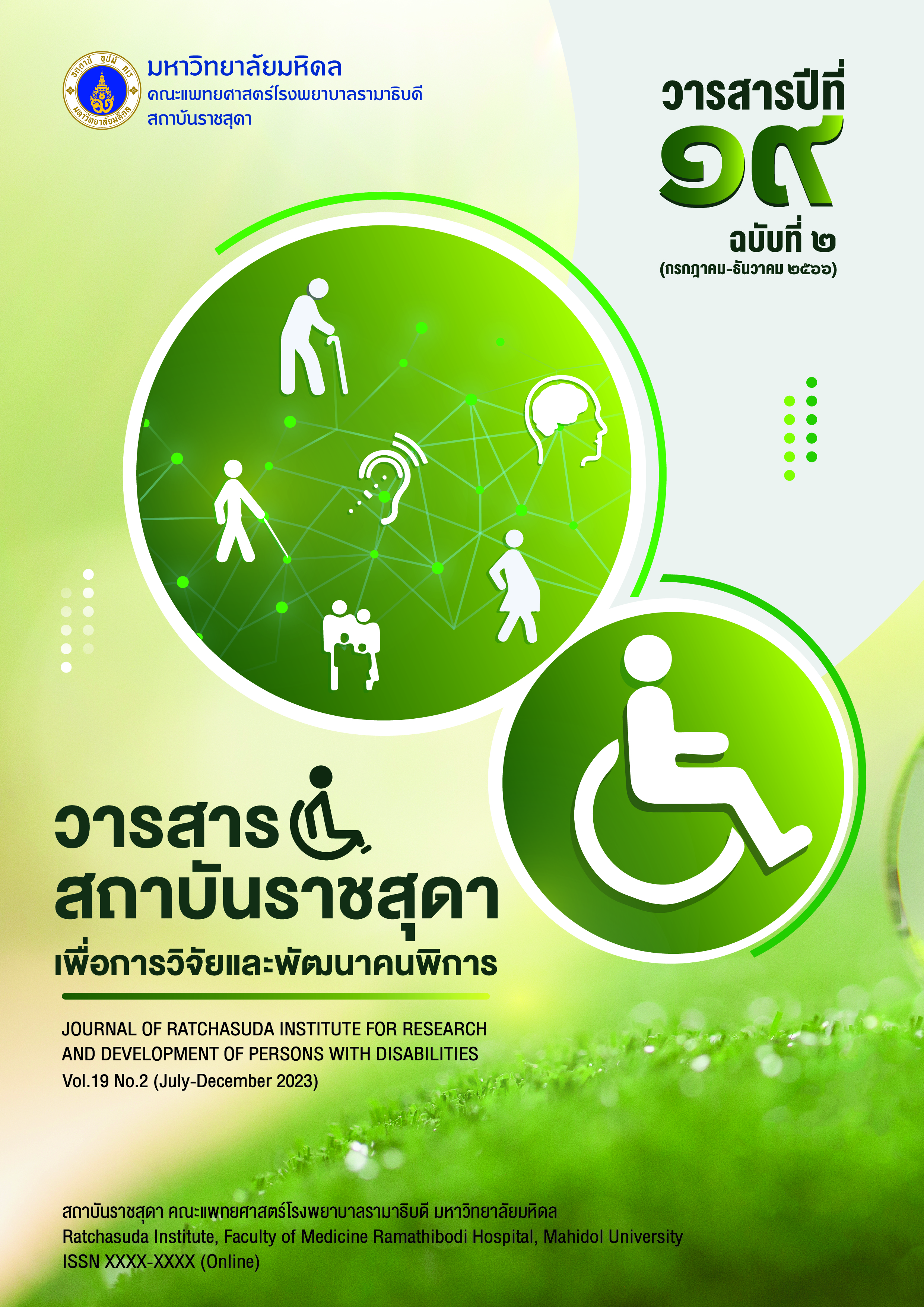The Study of 21st Century Skills among Deaf Undergraduate Students
Keywords:
21st Century Skill, Deaf Students, Factors Affecting SkillsAbstract
The goal of the study on 21st century skills among deaf undergraduate students is to look at the skills and the variables that affect them, as well as guidelines for promoting these skills among undergraduate students. With 117 participants, the study was carried out in the academic year 2021. A questionnaire and an interview form were used as research tools to examine undergraduate deaf students' 21st century competencies. The study found that the top three high-level skills were cross-cultural understanding, career, learning, and self-reliance, as well as collaboration, teamwork, and leadership, whereas the three lowest abilities, writing, arithmetic, and reading, were at an average level. Regarding personal factors influencing 21st century skills, it was found that 1) accommodation during studying influenced cross-cultural understanding 2) participation in activities or clubs influenced arithmetic 3) disability history influenced collaboration, teamwork and leadership and career, learning and self-reliance. 4) communications among family or parents using sign language influenced arithmetic and creativity and innovation and 5) deaf instructors or deaf seniors influenced arithmetic, creativity and innovation, and career, learning and self-reliance. The instructional factor affecting 21st century skills was students and the guidelines for 21st century skills promotion were to encourage the students to search, compare and analyze information, to practice Thai language skill and improve Arithmetic through instructional media by themselves, and also to provide deaf instructors who are adept at teaching, explaining and giving examples. Additionally, there should be collaboration between the government and private sector to create rules or legislation that clearly state that parents of deaf children must learn the fundamentals of sign language for daily communication and that they must get deaf cultural education.
Downloads
References
Artarsa, C., Chaikongkiat, P., Somjaree, C., & Siwadamrongpong, W. (2015). The correlations between the 21st century skills and the experiences gained by attending extracurricular activities of nursing students. Journal of Nursing, Public Health, and Education, 21(3), 69-78.
Bhuvaneswari, N. R., & Srivastava, K. A. (2016). Effect of training programme on developing functional sign language among parents of students with deafness. i-manager’s Journal on English Language Teaching, 6(4), 28-31.
Chompunut, J. (2020). The factors affecting learning skill in 21st century critical thinking and problem solving for high school in science mathematics learning plan [Master’s dissertation]. Naresuan University. http://www.edu.nu.ac.th
Department of Empowerment of Persons with Disabilities. (2023). Report on the situation of persons with disabilities in Thailand 2023. Department of Empowerment of Persons with Disabilities.
Khunaprom, T. (2015). Development of Skill Indicators in 21st Century for Undergraduate Students in Faculty of Science, State University, Northeast [Master’s dissertation]. Mahasarakham University. https://tdc.thailis.or.th
Kongsuwan, S., & Ruachai, B. (2020). Teaching and Learning for the Deaf in Thailand: Problems, Modelsand Bilingual Teaching Methods. Mangrai Saan Journal,Institute of International Language and Culture,Chiangrai Rajabhat University, 8(1), 3-10.
Ladd, P. (2003). Understanding deaf culture in search of deafhood (2th ed.). The Cromwell Press.
Littipanich, C. (2005). Adjustment to work environment of the first hearing impaired graduates of Ratchasuda College, Mahidol University with Bachelor of Art (Deaf Studies) in academic year 2003 [Master’s dissertation]. King Mongkuts University of Technology Thonburi. Bangkok (Thailand). Graduate School. https://doi.nrct.go.th
Marschark, M., & Hauser, P. C. (2012). How deaf children learn: what parents and teachers need to know. Oxford University Press.
Miller, S. M., Presswood, N. T., Metz, K., & Lukomski, J. (2015). Psychological and psychoeducational assessment of deaf and hard of hearing children and adolescents (2th ed.). Gallaudet University Press.
Ministry of Higher Education Science Research and Innovation. (2020). Report on the results of a survey on promoting and developing service systems to support students with disabilities in universities for the year 2020. Ministry of Higher Education Science Research and Innovation.
Pengpit, P. (2018). The factors affect the 21st century skills of undergraduate student’s Kasetsart University Kamphaeng Saen Campus [Master’s dissertation]. Silpakorn University.
Pharvasutipaisit, A., Sa-ngiam, R., & Keawdee, P. (2015). A Study on Child Rearing of Families with Deaf Children Who Have High Level of Self-Directed Learning Readiness. Silpakorn Educational Research Journal, 7(1), 61-62.
Pluemsamrankij, P. (2017). Factors affecting 21st century skill for learners. Valaya Alongkorn Review, 7(3), 142-153.
Siriattakul, P., Jamnongchan, S., Boonchuchuay, W., Kaewdoung, P., & Pimngern, S. (2016). Knowledge Management of Livelihood Development Process for Self-Reliance of Deaf Student in Deaf School Thailand. Journal of Interdisciplinary Research: Graduate Studies, 5(1), 8.
Siriattakul, P., Jamnongchan, S., Boonchuchuay, W., & Pimngern, S. (2015). Development of the Learning Management Model to Enhance Life Skillsof Deaf Early Adolescents (pp. 138). Bangkok: Health Systems Research Institute and Thai Health.
Soising, K. (2020). Factors affecting learning and innovation skills in the 21st century of the students at the Dusit Thani College. Dusit Thani College Journal, 14(2), 486-501
Sookpatdhee, T. (2017). The Arts Use to Build Skills for Hearing Impaired. The Golden Teak : Humanity and Social Science Journal, 23(2), 5-11.
Sri-on, J., Tedtim, J., Wittayawet, S., Soonthornphakdi, D., & Thongsri, W. (2007). The Follow-up and Evaluation of The First - Deaf - Study - Graduates in 2003 Academic year Ratchasuda College, Mahidol University. Ratchasuda College, Mahidol University.
Thanasetakorn, P. (2016). Attachment Theories and Brain Development. National Institute for Child and Family Development, Mahidol University.
Thanormchayathawat, B., Vanitsuppavong, P., Niemted, W., & Portjanatanti, N. (2016). 21st Century Skills: A Challenge for Student Development. The Southern College Network Journal of Nursing and Public Health, 3(2), 208-221.
Downloads
Published
How to Cite
Issue
Section
License
Copyright (c) 2023 Journal Of Ratchasuda Institute for Research and Development of Persons With Disabilities

This work is licensed under a Creative Commons Attribution-NonCommercial-NoDerivatives 4.0 International License.
บทความที่ได้รับการตีพิมพ์เป็นลิขสิทธิ์ของวารสารสถาบันราชสุดาเพื่อการวิจัยและพัฒนาคนพิการ






